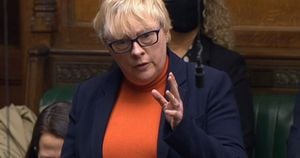The future of UK-EU relations remains tangled and bittersweet as Brexit discussions enter yet another challenging phase. Just five years after Boris Johnson's "Get Brexit Done" campaign, both the current Labour government and the European Union find themselves grappling with complex negotiations aimed at redefining mutual ties. With old assertions being revisited and fresh strategies proposed, the need for innovative approaches has never been clearer.
Denis MacShane, former Minister for Europe, openly criticized Yvette Cooper's Home Office for allegedly impeding progress on key negotiations. During recent debates, MacShane expressed his concerns about the Home Office's influence on the discussions, particularly the proposal for youth mobility, which has been increasingly prioritized by EU member states. The youth mobility scheme would enable under-30s to travel and work freely across the UK and EU, echoing sentiments held by several European leaders.
Yet, the Labour government seems apprehensive. Keir Starmer is unlikely to navigate the waters of free movement, clinging to red lines established during his campaign. The Prime Minister’s reluctance to make concessions stems from fears of backlash from within his party. Nick Thomas-Symonds, currently steering the Brexit reset talks, indicated potential openness for discussions but stressed the EU must clarify its stance before any breakthroughs occur.
On the ground, the atmosphere is one of cautious skepticism. MacShane suggested on X (formerly known as Twitter), "I fear Nick Thomas-Symonds sticking to an ultra-cautious line — it’s the Home Office obstructing progress. Under Tony Blair, the Treasury dampened closer EU relations; now it’s the Home Office." His remarks hint at past historical patterns affecting current affairs, subtly hinting at institutional inertia beyond individual leadership.
Simultaneously, the negotiations expose underlying tensions; fears lurk over foreign policy shifts influenced by growing tensions with the United States. With Donald Trump poised for another attempt at the presidency, speculation mounts around the influence of U.S. tariffs on UK trade, prompting decisions about whether to maintain closer ties with the EU or lean back toward America. The stakes appear higher than ever.
Adding to the challenges, the Labour government is faced with managing the complex dynamics of the Northern Ireland Assembly, where voting on the Windsor Framework revealed division and disagreement. Despite minor discussions to potentially revisit the agreement, the assembly held firm on its current stance, demonstrating the layered complexity of internal UK relations.
Meanwhile, the UK government pushes forward with its Product Regulation and Metrology Bill, aiming to offer the government sweeping powers to align with EU regulations selectively. Here, we see the government grasping for opportunities within its red lines, indicating some willingness to join legislative measures without full membership of the EU frameworks.
Creating the conditions for effective dialogue with the EU also encompasses the establishment of the refreshed Europe Unit led by Thomas-Symonds, tasked with unifying disparate Brexit elements. The unit's newly appointed senior official aims to set clear guidelines on future negotiations. While the lack of prompt action has raised eyebrows within political circles, late realization of the need for strategy development is seen as preferable to none.
Looking at the larger picture, the EU seems to cement its strategies, consistently enforcing its red lines without ceding ground on previously agreed terms. The focus on environmental measures, including plans for tax on carbon emissions at the border, compounds the worries faced by the UK, which seeks to tread carefully amid complex regulatory frameworks.
Overall, the British government finds itself amid unknown terrain, moving through negotiations entangled with social, economic, and political ramifications. Although proactively seeking engagement, the challenge of generating productive relationships with the EU continues to pose significant hurdles, with dialogues stretching thin as competing interests collide.
United against the backdrop of shifting allegiances, the future of UK-EU relationships stands as both precarious and hopeful, as each party seeks to navigate the delicate web of post-Brexit realities.



